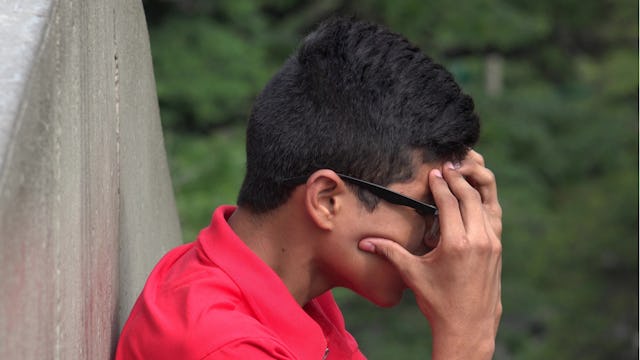Why I Stopped Medicating My Son's ADHD

For kids struggling with ADHD (and for their parents, who are at a constant loss about how to help them), medication is an awesome thing. I know, because after literally years of actively resisting it — trying everything under the sun except pharmaceutical intervention — I finally relented and had my son take the tiniest dosage.
And it was like the sun broke through the clouds after a never-ending stretch of gray days. His school days were better, parent-teacher conferences less exhausting. He was relieved of some of the mental, physical, and emotional burdens his severe ADHD had forced him to labor under for so long. He thanked us and said he wished we’d medicated him sooner. And for a while everything was peachy, as we reveled in the unaccustomed feeling of — for once — not fighting an uphill battle.
After a few months, though, it was like the effectiveness of the medicine began to “wear off.” He didn’t seem to respond to it as well as he used to, and his struggles began to re-emerge. His pediatrician increased the dosage. It worked, but only for a while. When it started to lose efficacy yet again, the doctor suggested switching to a different ADHD medication.
We did. It worked well enough, but was different, and he didn’t respond to it as well. It brought out a strange tic: Every time he was on his meds, he would get the sensation that his eyelashes were sticking together, and in a near-constant effort to alleviate the annoyance, he would pull at his lower eyelids until they were irritated and sore.
We lowered the dosage; the tic went away, but the medicine didn’t alleviate his ADHD symptoms. We raised the dosage and put him on an additional medication to help the tic; it made him drowsy, and he started falling asleep in class. We put him on yet another, different ADHD medication. This one affected him really negatively, messing up his sleep schedule and completely eliminating his appetite. He was able to pay attention in school — at least when his tic wasn’t bothering him — but at what cost? Was improved school performance worth a decline in his overall happiness and well-being?
The answer came through my son himself. “Mom, would you mind if I tried not taking my medicine for a while?” he asked. And without hesitation, I told him, yes, he absolutely didn’t have to be on it if he didn’t like the way it was making him feel. I told him I was frustrated with it too. And he hasn’t taken medication since weaning off those prescriptions.
Navigating life with unmedicated ADHD is difficult, and it’s evident when I watch my son struggle with all the things that the medication is designed to help: attention span, impulsiveness, hyperactivity, the ability to start something and follow it through to completion without constant redirection. But it was worse to watch him struggle with bruised eyes and sleepless nights, and seeing his ribs and hip bones jutting out because he was barely eating. It’s tough, either way — for all of us.
Out of fairness to his teachers who have an entire class full of kids to manage, and to our son who positively flounders in a classroom setting when he’s not medicated, we enrolled him in an online public school he can attend at home, where I can help keep him focused. We’re very lucky to have had that option, and it’s definitely helpful, at least for now.
I’m not making any permanent decisions regarding medication for my son, nor am I judging anyone who is medicating their child’s ADHD — not in the least — because I know firsthand how wonderful and life-changing it can be if you find the right medication at the right dosage. But in my son’s case, finding the right formula proved to be a huge challenge, and I wasn’t willing to medicine-hop at the expense of his physical and emotional well-being. So for now, we’re taking a break. Maybe we’ll revisit the meds a little later, but only if he wants to because he’s the central figure in this story, the one it affects the most. Not his teachers, not his parents, just one little boy who deserves to feel as normal as he can. Even if his “normal” looks a little bit different than most people’s.